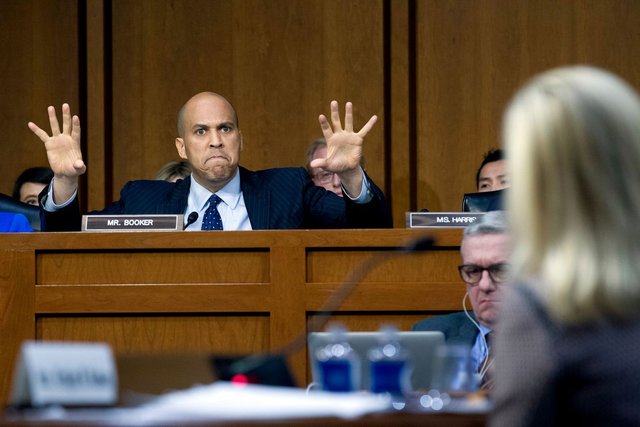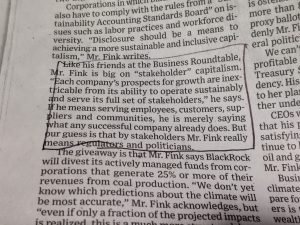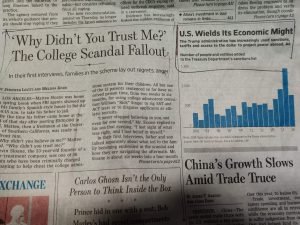
tl;dr: the digital age requires digital-native institutions so we can all get along. It’s about going forward, not backwards.
In Judaism, there is a concept known as a “milah mancha.” (don’t get caught up in the pronunciation efforts 😉
It is described as a “root word that appears several times within a section of text – to bring out a focus of that particular text, and to perhaps come up with a theme for a group of verses.”
Let’s call it the “Theme Word.”
Typically, this refers to the weekly portion of the Torah that is read, however, it can be used in multiple situations.
For example, the other day, the Theme Word of the Wall Street Journal weekend edition was: Institutions.
Institutions Under Strain
The big article that kicked this off was Barton Swaim’s, ‘A Time to Build’ Review: When All of Politics Is a Stage.
The subtitle was “Our institutions are weakened when people stop taking them seriously and start treating them instead as platforms for personal performance” and was accompanied by a very unflattering picture of Senator Cory Booker.

The money quote was:
[note: it’s a review of a book by Yuval Levin]
An institution, in Mr. Levin’s reckoning, is an organization that limits and molds its members for the accomplishment of socially important ends.
From the presidency, Congress and the federal court system to higher education and the news media, he [Levin] argues, America’s most important institutions have come to be thought of less as “molds” than as “platforms.”
Their role, in the minds of the nation’s most influential people, is not formative but performative: They do not shape their members so much as give them a stage on which to act.
The article was an reminder of just how important institutions are in our lives. They allow us to interact within a framework…at scale.
I will admit that, in moments of exasperation, there are moments when I think anarchically. That’s an emotional response on my part to the disgust that I feel at times with institutions that are called “venerable,” but which I don’t think are worthy of veneration.
Institutions Everywhere
The Theme Word was present, even if a bit hidden on the editorial page on the topic of Larry Fink, the CEO of Black Rock which has more than $7 trillion in investor money under management.
Mr. Fink apparently intends to use this vast amount of money to compel corporations to adopt more environmentally sustainable policies, even if they are less profitable.
The point here isn’t whether that is good or not. The point here is in the quote of Mr. Fink pictured below. Again, whether you agree with him or not, but he seems to be saying that modern corporation as an institution is no longer working.

Finally, the front page had two articles side by side with the idea of institutions behind them. The first was about how kids in college entrance fixing scandal felt betrayed by their parents. Again, not my primary concern because it’s the layer on top of the issue of “can we trust the institution of college to select the most qualified students and thereby trust the diplomas they get as a measure of intellectual quality, refined character, and work ethic?
For me, sadly, the answer these days is mostly no, with a few notable exceptions. I may be in the minority however.
Adjacent to that one was a chart showing how the US “wields economic might” in the enforcement of sanctions.

This type of sanction is only possible with the help of financial institutions around the world and only possible because the US dollar is the global reserve currency.
Again, whether you are in favor of this or not, is immaterial. What’s important is that there are plenty of people around the world who don’t have confidence in these institutions (see Danske Bank scandal) and plenty of countries that don’t want them to exist.
Institutions of the Future
The declining global trust has been well documented.
Swaim’s review of Levin’s book leaves us with the following:
“Mr. Levin puts the choice starkly. We can go on “fighting abstract theoretical battles in the wide-open spaces of our political culture”—shouting at cable-news shows, tweeting into the ether—or we can address “concrete practical problems within institutions.”
What I think is missing here is the third way…new institutions that provide the same benefits (or better) as traditional ones, but are structurally designed to make the kinds of problems we have today impossible.
I’m taking, of course, about Decentralized Autonomous Organizations (DAOs) and crypto economic systems overall.
The are technical platforms in one sense, but they are “molds” in the Levin sense. The software protocols actually mold people’s behavior because the rules are outlined, enforced equitably, and the incentives reinforce the desired behavior.
Secured by math, not the whims of emotional people, they are more likely to withstand efforts at grandstanding.
Going back to fix something to return it to a previous state is like saying “make America great again.” America can be great, but not in the way it was in the 1950s. That world is gone.
Democracy, higher education, and financial services can also be great again, but not in the way they were in the 1950s.
The digital world makes that impossible.